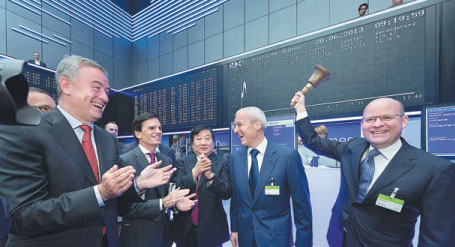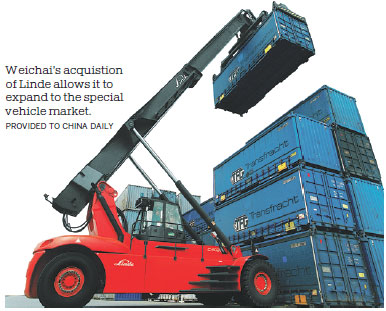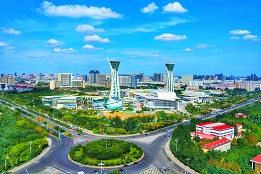Weichai sets bar high for upgrading
Core business strength key to heavy-duty engine manufacturer's enviable success
Many Chinese companies in the process of industrial upgrading are eager to learn how Weichai Group, a heavy-duty engines manufacturer once on the verge of bankruptcy, managed to come back from the brink and transform itself into an international company with an annual sales revenue of 230 billion yuan ($33.29 billion).
The answer is quite simple, which is it focused on its core businesses no matter how the outside situation changed, according to Tan Xuguang, chairman of Weichai Group.
The group was known as Weifang Diesel Engine Factory when it was established in 1946. In 1998, Weichai's annual losses reached 300 million yuan.
Led by Tan, Weichai undertook a series of reforms covering ownership, cutting unnecessary departments and improving management.
Weichai has expanded into many industries via mergers and acquisitions over the past two decades, such as marine engines and forklifts. However, Tan said Weichai's management team had never considered investing in real estate and low-end manufacturing projects, or to engage in finance speculation, though those industries reported very strong growth over the past decade.
Weichai's persistence has earned it a strong position in the engine development sector. It has established the only national-level key laboratory for internal combustion reliability in China. Many of its star products were developed in this lab over the past few years.
Statistics from Weichai show that the company has invested more than 15 billion yuan in engine development in the last 10 years. Its engine research and development input accounted for 40 percent of its total R&D expenditure in 2018, increasing from 36 percent year-on-year in 2017 and 32 percent in 2016.
Ten years of continuous input has yielded great returns for the company. Weichai has controlled the core technology in its powertrain development and was awarded first prize at the 2018 National Science and Technology Progress Awards for its breakthroughs in commercial vehicle powertrain development and applications, according to Tan.
The company's market share in China has been expanding for three consecutive years with the introduction of many value-added products to clients.
In Weichai, Tan said, employees are encouraged to contribute innovative ideas. Many of its projects have been named after staff members, and employees are informed that they should strive to be at the top of their field.
"The courage to become the best in the industry has supported Weichai's growth to become an international brand," Tan said.
Weichai wants to be not only the top player in China, but also in the global market. The group has successfully expanded into markets in Southeast Asia, South Asia, the Middle East, North Africa and Europe.
"Engine production is a highly market-driven sector. Global giants have already established strong positions in China. Weichai has to expand globally to strengthen its competitiveness," said Sun Shaojun, executive director of Weichai Power, the listed arm of the group.
Mergers and acquisitions are a key way for Weichai to expand its global influence and awareness.
In 2009, Weichai Power acquired French marine engine developer and producer Moteurs Baudouin. The deal allowed Weichai Power to fill a technological gap and speed up exploration in European and American markets.
In 2012, Weichai Power purchased a majority stake in Italian yacht-maker Ferretti, to tap into the luxury yacht sector.
In 2017, Weichai America, a wholly-owned subsidiary of Weichai Power, invested in leading alternative-fuel power system developer Power Solutions International in March.
"Every effort of Weichai is to expand our core businesses," Tan said.
Weichai's expansion focuses on filling the gap and optimizing its business structure, he added.
On the back of outstanding results in 2018, Weichai management have vowed to never stop evaluating potential risks and making preparations in the market.
It's not all been clear sailing for the company, with Weichai experiencing some decline over the past decade, forcing Tan and his team to pay more attention to innovation and developing new products.
"High-quality development means companies have to develop technology which cannot be replicated, can always create value and is sustainable," Tan said. "A company cannot achieve good outcomes without such technology."
tangzhihao@chinadaily.com.cn

Germany-based Kion Group, in which Weichai holds a 25 percent stake, goes public at the Frankfurt Stock Exchange on June 28, 2013.Photos Provided To China Daily

(China Daily 06/19/2019 page12)




